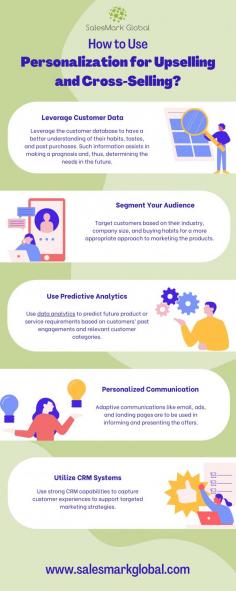
Effective personalization strategies include:
Leverage Customer Data: Leverage the customer database to have a better understanding of their habits, tastes, and past purchases. Such information assists in making a prognosis and, thus, determining the needs in the future.
Segment Your Audience: Target customers based on their industry, company size, and buying habits for a more appropriate approach to marketing the products.
Use Predictive Analytics: Use data analytics to predict future product or service requirements based on customers’ past engagements and relevant customer categories.
Personalized Communication: Adaptive communications like email, ads, and landing pages are to be used in informing and presenting the offers.
Utilize CRM Systems: Use strong CRM capabilities to capture customer experiences to support targeted marketing strategies.
Read the article -
https://salesmarkglobal.com/personalization-in-cross-selling-campaigns/

